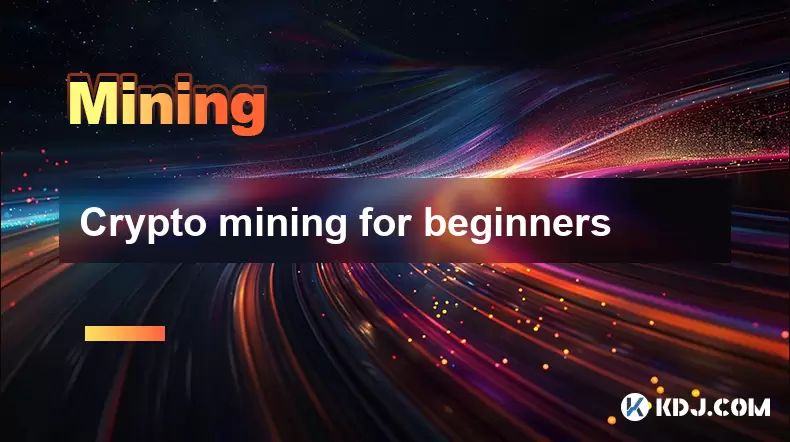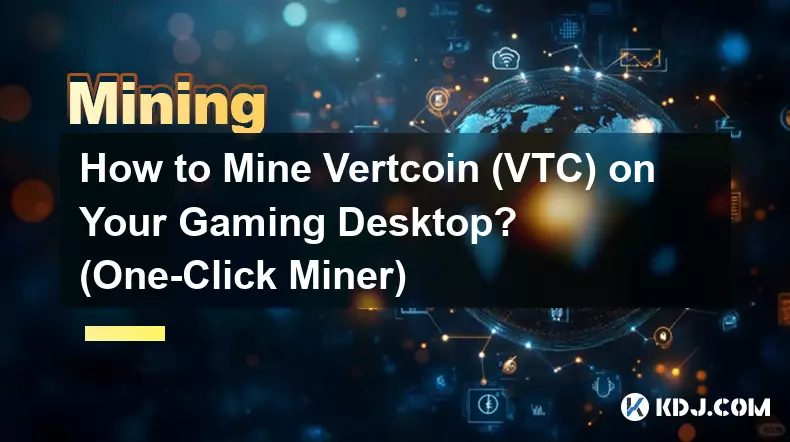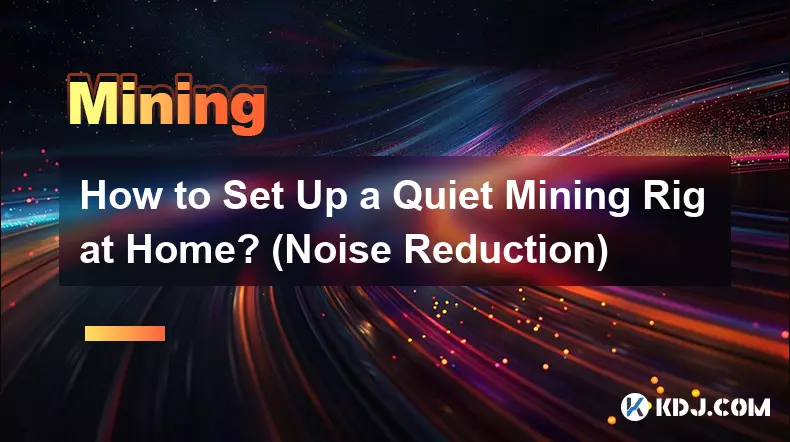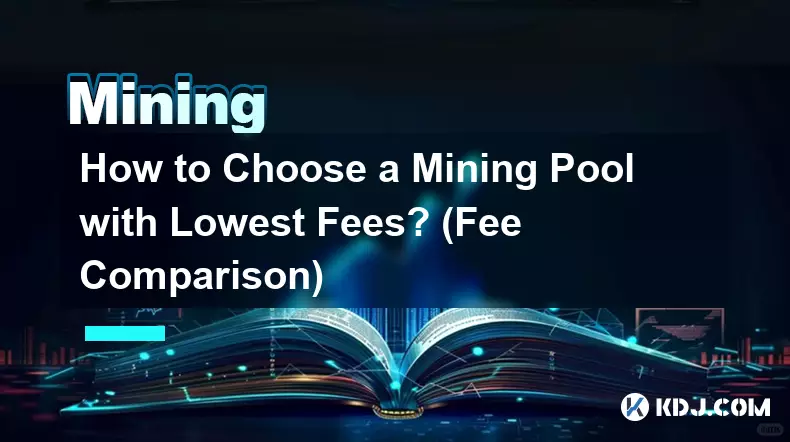-
 bitcoin
bitcoin $87959.907984 USD
1.34% -
 ethereum
ethereum $2920.497338 USD
3.04% -
 tether
tether $0.999775 USD
0.00% -
 xrp
xrp $2.237324 USD
8.12% -
 bnb
bnb $860.243768 USD
0.90% -
 solana
solana $138.089498 USD
5.43% -
 usd-coin
usd-coin $0.999807 USD
0.01% -
 tron
tron $0.272801 USD
-1.53% -
 dogecoin
dogecoin $0.150904 USD
2.96% -
 cardano
cardano $0.421635 USD
1.97% -
 hyperliquid
hyperliquid $32.152445 USD
2.23% -
 bitcoin-cash
bitcoin-cash $533.301069 USD
-1.94% -
 chainlink
chainlink $12.953417 USD
2.68% -
 unus-sed-leo
unus-sed-leo $9.535951 USD
0.73% -
 zcash
zcash $521.483386 USD
-2.87%
Crypto mining for beginners
Crypto mining involves validating blockchain transactions using powerful hardware, with miners earning rewards in cryptocurrency for their computational efforts.
Jul 16, 2025 at 12:15 pm

Understanding the Basics of Crypto Mining
Crypto mining refers to the process of validating transactions on a blockchain network and adding them to the public ledger. This task is performed by miners who use powerful computers to solve complex mathematical problems. In return for their efforts, miners are rewarded with newly minted cryptocurrency coins, such as Bitcoin or Ethereum.
At its core, crypto mining ensures the security and integrity of decentralized networks. Unlike traditional banking systems that rely on central authorities, blockchains depend on distributed consensus mechanisms like Proof of Work (PoW) or Proof of Stake (PoS). PoW-based cryptocurrencies require miners to compete in solving cryptographic puzzles, while PoS-based ones rely more on validators holding significant amounts of coins.
It's crucial to understand that mining difficulty increases over time due to algorithm adjustments aimed at maintaining consistent block creation times.
Selecting the Right Cryptocurrency to Mine
Not all cryptocurrencies are suitable for beginners. Some require specialized hardware known as ASICs (Application-Specific Integrated Circuits), which can be expensive and energy-intensive. Others, like Ethereum Classic or Monero, allow mining using GPUs (Graphics Processing Units), making them more accessible to newcomers.
When choosing a cryptocurrency to mine, consider the following factors:
- Mining profitability: Check online calculators to estimate potential returns based on your hardware and electricity costs.
- Network difficulty: Higher difficulty means fewer rewards unless you have high-performance equipment.
- Community support: Active communities often provide better guides, troubleshooting help, and software updates.
Beginners should start with GPU-friendly coins before investing in ASIC miners or cloud mining contracts.
Setting Up Your Mining Hardware
The first physical step in crypto mining involves setting up the necessary hardware. For most beginners, this means acquiring one or more high-performance GPUs capable of handling intensive hashing operations.
Here’s how to prepare your mining rig:
- Choose compatible components: Ensure your motherboard supports multiple GPUs and has enough PCIe slots.
- Power supply considerations: A reliable power supply unit (PSU) with sufficient wattage is essential to avoid overheating or damage.
- Cooling solutions: Proper ventilation and cooling prevent thermal throttling and extend hardware lifespan.
- Mining software compatibility: Confirm that your chosen mining OS and software work seamlessly with your hardware configuration.
Use a lightweight operating system like HiveOS or EthOS for efficient remote management of your mining rig.
Installing Mining Software and Joining a Pool
Once your hardware setup is complete, the next step involves installing mining software and connecting to a mining pool. Mining pools combine the processing power of multiple miners, increasing the chances of earning regular rewards.
Popular mining software includes:
- NiceHash: Offers automatic switching between profitable algorithms.
- Claymore’s Dual Miner: Widely used for Ethereum mining.
- PhoenixMiner: Known for stability and efficiency in mining Ethereum and similar coins.
Joining a mining pool typically requires creating an account and configuring your miner with the pool’s server address, port, and worker credentials.
Always choose a reputable mining pool with low fees and transparent payout structures.
Monitoring Performance and Managing Earnings
After your mining operation is up and running, continuous monitoring becomes vital. Most mining software provides real-time data on hash rates, temperatures, and earnings.
To effectively manage your mining activities:
- Use dashboard tools provided by your mining OS or third-party apps to track performance metrics.
- Regularly check for software updates to optimize efficiency and fix bugs.
- Monitor electricity consumption to ensure mining remains profitable after deducting operational costs.
- Set up automatic payouts from your mining pool to a secure wallet.
Consider using a dedicated wallet service like Trust Wallet or MetaMask to store your mined coins securely.
Frequently Asked Questions
Q1: Can I mine crypto on my personal computer?Yes, but only certain cryptocurrencies like Monero or Ethereum Classic can be mined efficiently on consumer-grade PCs. Be aware that prolonged mining may reduce the lifespan of your hardware components due to increased heat and usage.
Q2: Is mining still profitable for beginners?Profitability depends heavily on local electricity costs, initial investment in hardware, and the current market price of the mined coin. Beginners should perform detailed calculations using mining profitability calculators before starting.
Q3: What is the difference between solo mining and pool mining?Solo mining means attempting to mine blocks alone without sharing resources, which is rarely successful without high-end hardware. Pool mining involves joining a group of miners to increase the likelihood of receiving regular, albeit smaller, rewards.
Q4: Do I need an internet connection for mining?Yes, a stable and fast internet connection is necessary to communicate with the blockchain network and mining pools. While bandwidth usage isn’t extremely high, interruptions can lead to missed blocks and reduced earnings.
Disclaimer:info@kdj.com
The information provided is not trading advice. kdj.com does not assume any responsibility for any investments made based on the information provided in this article. Cryptocurrencies are highly volatile and it is highly recommended that you invest with caution after thorough research!
If you believe that the content used on this website infringes your copyright, please contact us immediately (info@kdj.com) and we will delete it promptly.
- Bitcoin’s Wild Ride: Crypto Market Faces Price Drop Amidst Extreme Fear and Macro Headwinds
- 2026-02-02 12:30:01
- UAE Investor Secures Major Stake in Trump-Linked Crypto Firm Amidst Shifting Geopolitical Tides
- 2026-02-02 07:10:01
- Pepe Meme Coin: Navigating the Hype, Price Predictions, and Future Outlook in 2026 and Beyond
- 2026-02-02 07:05:01
- Blockchain Gaming's Quiet Revolution: Unpacking Latest Trends and Industry Insights Amidst Market Shifts
- 2026-02-02 06:30:01
- IPO Genie, Tokenization, and YouTubers: The Big Apple's Next Big Bet on Democratized Wealth
- 2026-02-02 06:40:02
- Aptos in a Bind: Downtrend Deepens, But a Brief Relief Bounce Looms Before the Next Plunge
- 2026-02-02 07:00:01
Related knowledge

How to Spot a Cloud Mining Scam? (Red Flags to Watch For)
Feb 02,2026 at 08:20am
Unrealistic Return Promises1. Platforms advertising guaranteed daily returns above 1–2% without disclosing underlying hardware, electricity costs, or ...

How to Earn Passive Income with DePIN Mining? (New Trend 2026)
Feb 01,2026 at 12:40pm
Understanding DePIN Mining Mechanics1. DePIN mining relies on real-world infrastructure participation rather than computational hashing. Users deploy ...

How to Mine Vertcoin (VTC) on Your Gaming Desktop? (One-Click Miner)
Feb 02,2026 at 03:39am
Understanding Vertcoin's Mining Algorithm1. Vertcoin uses the Verthash algorithm, which is intentionally memory-hard and designed to resist ASIC domin...

How to Set Up a Quiet Mining Rig at Home? (Noise Reduction)
Feb 01,2026 at 11:00pm
Acoustic Enclosure Design1. Use rigid, dense materials such as MDF or acoustic-grade plywood for the enclosure walls to block mid-to-high frequency no...

How to Choose a Mining Pool with Lowest Fees? (Fee Comparison)
Feb 02,2026 at 02:39am
Understanding Mining Pool Fee Structures1. Pool operators charge fees to cover infrastructure, maintenance, and administrative costs. These fees manif...

How to Mine Bitcoin on Mac (M1/M2/M3)? (Software Tutorial)
Feb 01,2026 at 07:19pm
Understanding Bitcoin Mining on Apple Silicon1. Bitcoin mining relies on solving cryptographic puzzles using computational power, and Apple’s M1, M2, ...

How to Spot a Cloud Mining Scam? (Red Flags to Watch For)
Feb 02,2026 at 08:20am
Unrealistic Return Promises1. Platforms advertising guaranteed daily returns above 1–2% without disclosing underlying hardware, electricity costs, or ...

How to Earn Passive Income with DePIN Mining? (New Trend 2026)
Feb 01,2026 at 12:40pm
Understanding DePIN Mining Mechanics1. DePIN mining relies on real-world infrastructure participation rather than computational hashing. Users deploy ...

How to Mine Vertcoin (VTC) on Your Gaming Desktop? (One-Click Miner)
Feb 02,2026 at 03:39am
Understanding Vertcoin's Mining Algorithm1. Vertcoin uses the Verthash algorithm, which is intentionally memory-hard and designed to resist ASIC domin...

How to Set Up a Quiet Mining Rig at Home? (Noise Reduction)
Feb 01,2026 at 11:00pm
Acoustic Enclosure Design1. Use rigid, dense materials such as MDF or acoustic-grade plywood for the enclosure walls to block mid-to-high frequency no...

How to Choose a Mining Pool with Lowest Fees? (Fee Comparison)
Feb 02,2026 at 02:39am
Understanding Mining Pool Fee Structures1. Pool operators charge fees to cover infrastructure, maintenance, and administrative costs. These fees manif...

How to Mine Bitcoin on Mac (M1/M2/M3)? (Software Tutorial)
Feb 01,2026 at 07:19pm
Understanding Bitcoin Mining on Apple Silicon1. Bitcoin mining relies on solving cryptographic puzzles using computational power, and Apple’s M1, M2, ...
See all articles










































































